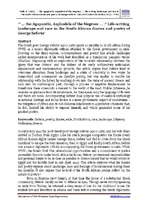‘… The Agapanthi, Asphodels of the Negroes…’: Life-writing, landscape and race in the South African diaries and poetry of George Seferis
Abstract
The Greek poet George Seferis (1900-1971) spent 10 months in South Africa
during WWII as a senior diplomatic official attached to the Greek government
in exile. Drawing on his diary entries, correspondence and poetry this article
challenges earlier interpretations of his work best described as a ‘synchronic
panoptic vision’ (Bhabha). Beginning with an exploration of the troubled
relationship between the ‘glory that was Greece’ and the failure of its early 20thcentury
nationalist, expansionist and modernization projects, the article argues
that Seferis tried to overcome alienation from landscape and a crisis of creativity
in two ways: he transcribed and commented on Cavafy’s poetry, but was unable
to resolve his relationship with the latter; by reaching down into the ruins of
ancient Greece and back into its mythological past, through a process of negative
displacement he transforms these crises into a descent to the world of the dead.
Unlike Odysseus, he receives no guidance from its inhabitants, for they speak
only the language of flowers and there are none. Accompanying Seferis’ dual
purpose use of classical mythology as national heritage and ironic device is a
more problematic aspect of modernism – the relegation of Africa and its sub-
Saharan inhabitants to a primitive otherness that, he felt, limited his ability to
express himself, and which generated some of his greatest poetry.

